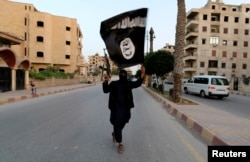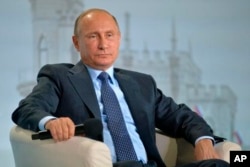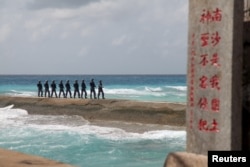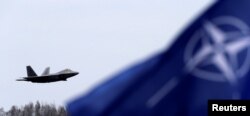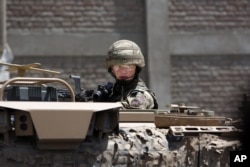While foreign policy is often given short shrift in American presidential campaigns, the rest of the world has tuned in this year to find out where Hillary Clinton and Donald Trump stand on issues over which millions of lives are at stake.
Will Americans elect a candidate who’s vowed to “knock the hell out of ISIS” or will they pick a candidate who’s said she wants to be “caught trying” to do something about the conflict in Syria?
As Americans go to the polls on Tuesday, here is a look at four foreign policy issues over which the two candidates argued the most and one topic they largely ignored:
Fighting IS
With voters citing terrorism as one of the most pressing issues facing the country, the U.S.-led fight against the Islamic State (IS) terror group became one of the focal points of the campaign.
The issue came up repeatedly during all three presidential debates.
Projecting toughness on terrorism, each candidate claimed to have a better plan to defeat IS even if they couldn't agree whether the threat posed by the group was "radical Islamic terrorism" or "radical jihadism."
Trump accused Clinton of "founding" IS by promoting policies that created instability in the greater Middle East when she was secretary of state and U.S. senator; Clinton sharply questioned her opponent's temperament, judgment and experience in navigating foreign affairs.
Though widely mocked for mentioning a plan to defeat IS but keeping it "secret," Trump did offer some clues about how he intends to fight terror. He proposed a contentious ban on Muslims and said he'd work with "moderate" Arab nations and Russia to defeat IS, rather than arming Syrian rebels to oust the regime of President Bashar al-Assad.
Beyond the tough rhetoric and some differences over tactic and strategy, however, neither candidate offered a grand plan for defeating IS and ending the conflict in Syria beyond "doing a little more than Barack Obama," as one analyst put it.
Russia
With U.S.-Russia relations at a post-Cold War nadir and the two candidates holding diametrically opposed views, it was no surprise that Russia emerged as a hot-button issue during the campaign.
The disagreement began last fall with Trump's praise of Russian President Vladimir Putin, and deepened as Russia intensified its bombing campaign in Syria and as allegations of Russian hacking of Democratic Party email accounts surfaced.
Trump dismissed Russian involvement in hacking Democratic Party computer systems and portrayed Putin as someone he could "get along" with, even as a group of former Republican national security officials warned about it in an open letter opposing his candidacy.
Clinton took a tough line on Moscow, vowing to "stand up to Putin," whom she accused of favoring Trump. As secretary of state in Obama's first term, Clinton championed the administration's so-called Russia "reset" policy before it unraveled with Putin's return to the presidency in 2012.
Though she pledged to work with the Kremlin on issues of mutual interest, the Democrat threatened broader sanctions against Russia for its 2014 annexation of Crimea and incursion into Ukraine, and called for investigating Russia and Syria for war crimes allegedly committed in Aleppo.
China
The debate over China — from Chinese trade practices to cyberterrorism to military assertiveness in the South China Sea — was the mirror image of the argument over Russia, with Clinton advocating engagement and Trump adopting a tough line that struck critics as go-it-alone unilateralism.
Trump repeatedly warned that China was trying "to rip this country" and vowed to renegotiate trade deals with China and other countries. In a major foreign policy speech in April, he warned that the two countries could either have a mutually beneficial relationship or "we can both go our separate ways."
Viewing China as a strategic rival rather than an adversary, Clinton pledged to expand cooperation with Beijing when it serves U.S. interests and to stand up to China when necessary. She made headlines last month by proposing a missile defense "ring" around China, but also warned against unilateral action against Beijing.
NATO
The 68-year-old transatlantic alliance, rarely the subject of controversy in the United States, was thrust into the campaign as Trump questioned its utility and called on NATO members to pay their "fair share" on defense.
To the alarm of European allies and critics at home, Trump suggested that he would not automatically come to the aid of NATO's Baltic members if they were attacked by Russia.
He also threatened to pull out of long-standing alliances with Japan and South Korea if they did not increase their share of the military burden.
Trump supporters have downplayed Trump's comments about NATO, but Trump himself did not budge in his position.
Clinton said she agreed with the call for allies to up their contribution to defense, but she accused Trump of seeking to "break up NATO" and pledged to strengthen America's military alliances, including NATO.
Afghanistan
Despite an intensifying Taliban insurgency, the war in Afghanistan received surprisingly little attention from either candidate.
The conflict, often described as America's longest war, came up during one of the three presidential debates and only in passing when Clinton discussed it in the context of NATO's support after 9/11.
In his only major speech devoted to foreign policy in April, Trump made no mention of the war.
In cursory comments earlier in the campaign, however, both candidates expressed support for President Barack Obama's plan to keep fewer than 10,000 American troops in Afghanistan.
Clinton, who as secretary of state backed Obama's Afghan troop surge, indicated a willingness to extend troop commitments if conditions warranted, but said she didn't want them engaged in ground combat but rather to support and train Afghan forces.
Trump has not said whether he'll extend troop levels, but after initially calling the 2001 U.S. invasion of Afghanistan a "terrible mistake," he said keeping troops in Afghanistan was necessary if only to keep an eye on its nuclear-armed neighbor, Pakistan.





